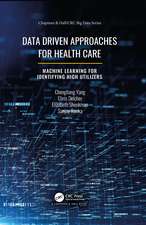Koenig and Schultz's Disaster Medicine: Comprehensive Principles and Practices
Editat de Kristi L. Koenig, Carl H. Schultzen Limba Engleză Hardback – 17 apr 2016
Preț: 1493.61 lei
Preț vechi: 1572.23 lei
-5% Nou
Puncte Express: 2240
Preț estimativ în valută:
285.83€ • 298.04$ • 237.56£
285.83€ • 298.04$ • 237.56£
Carte disponibilă
Livrare economică 28 februarie-14 martie
Preluare comenzi: 021 569.72.76
Specificații
ISBN-13: 9781107040755
ISBN-10: 1107040752
Pagini: 782
Ilustrații: 172 colour illus. 144 tables
Dimensiuni: 223 x 286 x 37 mm
Greutate: 2.34 kg
Ediția:Revizuită
Editura: Cambridge University Press
Colecția Cambridge University Press
Locul publicării:New York, United States
ISBN-10: 1107040752
Pagini: 782
Ilustrații: 172 colour illus. 144 tables
Dimensiuni: 223 x 286 x 37 mm
Greutate: 2.34 kg
Ediția:Revizuită
Editura: Cambridge University Press
Colecția Cambridge University Press
Locul publicării:New York, United States
Cuprins
Part I. Conceptual Framework and Strategic Overview: 1. Disaster research and epidemiology Megumi Kano, Michele M. Wood, Judith M. Siegel and Linda B. Bourque; 2. Disaster education and training: linking individual and organizational learning and performance Peter W. Brewster; 3. Surge capacity and scarce resource allocation Donna F. Barbisch; 4. Climate change Richard A. Matthew and Jamie L. Agius; 5. International perspectives on disaster management Jean Luc Poncelet; 6. Community resilience Rose L. Pfefferbaum, Richard Reed and Betty Pfefferbaum; 7. Ethical issues in disaster medicine George J. Annas; 8. Emerging infectious diseases: concepts in preparing for and responding to the next microbial threat Shantini D. Gamage, Stephen M. Kralovic and Gary A. Roselle; 9. Disaster behavioral health James C. West, Merritt D. Schreiber, David Benedek and Dori B. Reissman; 10. Populations with functional or access needs Brenda D. Phillips and Laura M. Stough; Part II. Operational Issues: 11. Public health and emergency management systems Connie J. Boatright-Royster and Peter W. Brewster; 12. Legislative authorities and regulatory issues Ernest B. Abbott and Jeffrey H. Luk; 13. Syndromic surveillance Gary A. Roselle; 14. Triage Christopher A. Kahn, E. Brooke Lerner and David C. Cone; 15. Personal protective equipment Howard W. Levitin; 16. Decontamination Howard W. Levitin and Christopher A. Kahn; 17. Quarantine James G. Hodge, Jr and Lawrence O. Gostin; 18. Mass dispensing of medical countermeasures Susan E. Gorman; 19. Management of mass gatherings Michael S. Molloy; 20. Transportation disasters Ulf Björnstig and Rebecca Forsberg; 21. Emergency medical services scene management Kenneth T. Miller; 22. Healthcare facility disaster management John D. Hoyle, Sr; 23. Mass fatality management Paul S. Sledzik and Sharon W. Bryson; 24. Rehabilitation of disaster casualties James E. Gosney, Jr and Colleen O'Connell; 25. Crisis and emergency risk communication Barbara J. Reynolds and Gilead Shenhar; 26. Telemedicine and telehealth role in public health emergencies Adam W. Darkins; 27. Complex public health emergencies Frederick M. Burkle, Jr; 28. Patient identification and tracking Andreas Ziegler; 29. Explosive events Glenn D. Burns and John M. Wightman; Part III: Section 1. Clinical Management: CBRNE and Hazmat: 30. Burn event management Tina L. Palmieri, Ariel Tessone and Josef Haik; 31. Clinical aspects of large-scale chemical events Jonathan Newmark; 32. Biological events Zygmunt F. Dembek and Theodore J. Cieslak; 33. Nuclear and radiological events Richard J. Hatchett, David M. Weinstock and Ronald E. Goans; 34. Hazardous material, toxic, and industrial events Hoon Chin Lim and Hock Heng Tan; Section 2. Clinical Management: Environmental Events: 35. Floods Mark E. Keim; 36. Cyclones, hurricanes, and typhoons Kelly R. Klein and Frank Fuh-Yuan Shih; 37. Tornadoes Arthur G. Wallace, Jr; 38. Earthquakes Carl H. Schultz and Shira A. Schlesinger; 39. Tsunamis Samuel J. Stratton; 40. Winter storms and hazards John M. Wightman and William H. Dice; 41. Extreme heat events Carl Adrianopoli and Irving Jacoby; 42. Landslides Iain T. R. Kennedy, David N. Petley and Virginia Murray; 43. Volcanoes Peter J. Baxter.
Recenzii
Review of previous edition: 'There are so many exceptional chapters in this text that it is almost unfair to single out selected ones for praise … Even those who consider themselves experienced will learn a lot in studying from this compilation … meticulously researched and exhaustive … Disaster Medicine: Comprehensive Principles and Practices is just that:comprehensive. Students, seasoned practitioners, health systems organizations, and academic institutions will find it a most welcome and invaluable addition to their reference libraries.' Annals of Emergency Medicine
'The importance of this book cannot be overemphasized.' Nano Khilani, Biz India
'In its second edition, Koenig and Schultz' Disaster Medicine: Comprehensive Principles and Practices again proves itself to be the definitive resource for healthcare providers ranging from first responders to fellowship-trained physicians. The second edition is a valuable upgrade for disaster managers and emergency clinicians alike.' Eric C. Silverman, Academic Emergency Medicine
'The importance of this book cannot be overemphasized.' Nano Khilani, Biz India
'In its second edition, Koenig and Schultz' Disaster Medicine: Comprehensive Principles and Practices again proves itself to be the definitive resource for healthcare providers ranging from first responders to fellowship-trained physicians. The second edition is a valuable upgrade for disaster managers and emergency clinicians alike.' Eric C. Silverman, Academic Emergency Medicine
Descriere
This is the definitive reference on disaster medicine, outlining areas of proficiency for health care professionals handling mass casualty crises.

